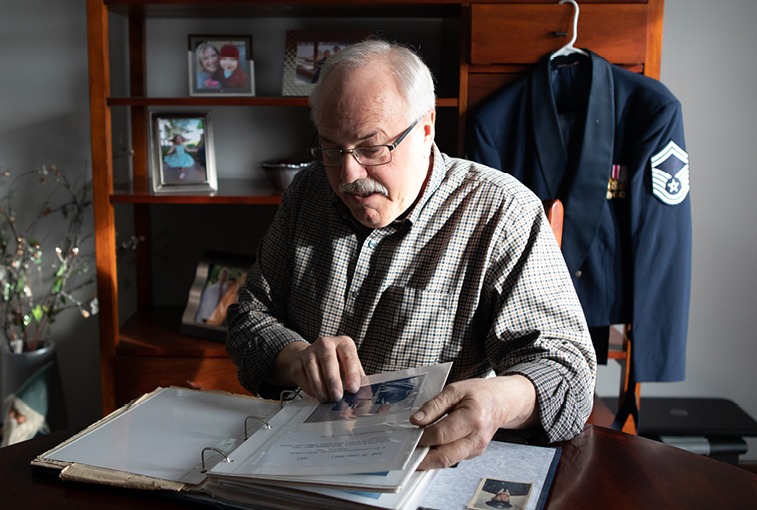David Rowe is one of millions of men and women who have served our country. The father and husband served in the military for more than 30 years before retiring, and he is one of the first veterans to complete genetic testing at Sanford Health at no cost.
Sanford Health wanted to give back to veterans like Rowe for their service. Through a generous gift from Denny Sanford and a fundraising effort, Sanford Health can now offer its patients with current or past U.S. military service the option to get the genetic test at no cost.
Rowe volunteered to be one of the first. His passion for his fellow service members was part of the reason he wanted to share his experience.
Three decades of service
“I enlisted in the Air Force in October 1970. That’s back when we had the draft. I was not interested in getting drafted, so I enlisted in the Air Force. That’s where my dad had been, so that’s where I chose,” Rowe said.
He completed his basic and immediate training in Texas and Mississippi before being stationed in Sacramento, California. His first full-time assignment was with the 2049th communications group at McClellan Air Force Base. A year and a half into his military career, his unit was sent to Vietnam.
“After Vietnam, I got stationed closer to home at Offutt Air Force Base in Omaha,” Rowe said. “But there were so many people coming back from Vietnam, and they didn’t have room for everybody. There was a program that allowed us to get out of the service earlier. We could spend twice as much time with an Air Guard unit as we had left in the service. So I joined the South Dakota Air Guard to finish out my service time.”
“Well, I got in the Air Guard and never got out,” Rowe said. “I ended up retiring after 27 years in the Air Guard — about 31 years of military service total.”
After leaving the Air Force in 1973 and joining the Air Guard, Rowe started working for the Sioux Falls, South Dakota, Police Department. For the next 30 years, Sioux Falls citizens knew Rowe as one of the city’s police officers.
A problem of the heart
Ten years ago, Rowe had his first heart episode. Because of the trial and error he has experienced with medications in the past, he thought pharmacogenetic testing would be a good option to prevent similar issues in the future.
“When I had my first heart episode, they took care of it right away at Sanford Health,” Rowe said. “My doctor had to switch my medication a few times because I had a reaction. Through this genetic testing, now my care team might be able to prevent side effects from any of my medication.”
To complete the test, Rowe gave a small blood sample at a Sanford Health lab, just like any other routine lab test. That was it.
From there, Sanford Health tested the sample for inherited disease risk. The sample was also tested for pharmacogenetics, which show the ways genetic changes influence a person’s ability to metabolize and process medications.
“I recently got a phone call that gave me a really good report on what they’d found in my testing. I’ve also received the paperwork in the mail that has everything documented,” Rowe said.
A family man
“One of the other reasons I got the test is for my kids,” Rowe said. “They are aware that their grandfather passed away of a heart attack, and they’re aware that I’m carrying five stents. I think it’s neat for my family to know that genetic testing is there — just so they can be comfortable knowing where my health is. But also, they will know if our family has an issue they need to be aware of.”
The information hidden in DNA helps us understand the intricacies of health. With genetic testing, doctors at Sanford Health can more precisely prescribe medications, but they can also predict, diagnose, screen and manage inherited genetic conditions and other diseases.
“Any time there’s any kind of an issue with a family member, the younger generation may need to check that out to make sure it’s not hereditary,” Rowe said.
Genetic testing results can be combined with a patient’s family and personal history, risk factors and the latest screening guidelines and medical information. That way, care is personalized to each person’s needs, and health can be improved across a lifetime.
“If I’ve got an issue, I am the type of person who wants to know ahead of time. Do I need to adjust my lifestyle so that it doesn’t occur? Can I do anything?” Rowe said.
“I think the message is: It’s there. Go get tested to see what shows up. Maybe it shows a clean bill of health. Maybe it’s going to surprise you. But if you don’t get tested, how do you know?” Rowe said. “If I could talk to other veterans, I would encourage them to get the genetic test done. It was as simple as getting a blood test.”
Learn more
- Veterans genetic testing at Sanford Imagenetics
- Sanford Health, VA create partnership to help veterans’ care
- Sanford Health’s path to bringing precision care to veterans
…
Posted In Cancer Screenings, Genetics, Innovations, Veterans

